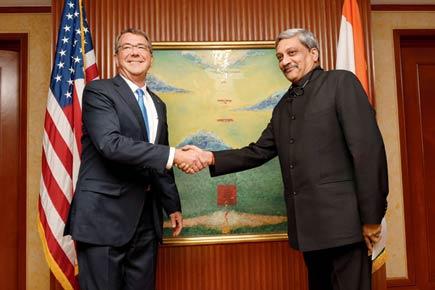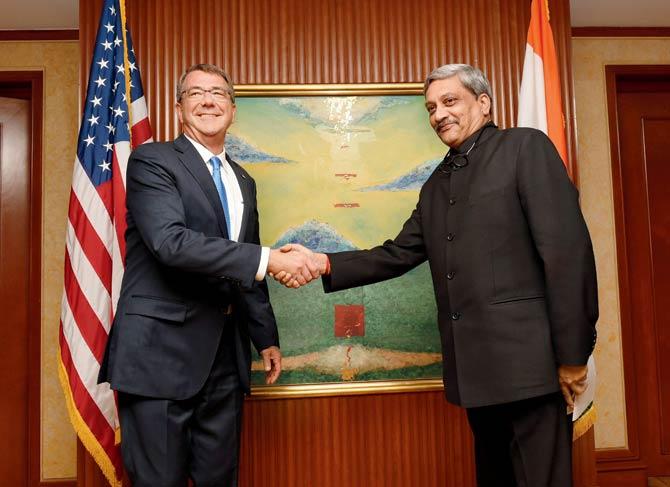The Modi government takes pride in its hands-on approach to foreign affairs, but was disappointingly ambivalent on South-East Asian issues

 The Shangri-La dialogue hosted annually by the Institute of Strategic Studies, London, is a major event in Singapore. Though it has, in recent years, become something of a China versus US event, it is a place where defence ministers, security wonks and media gather, an ideal place to make a statement, signal an intent or a new policy.
The Shangri-La dialogue hosted annually by the Institute of Strategic Studies, London, is a major event in Singapore. Though it has, in recent years, become something of a China versus US event, it is a place where defence ministers, security wonks and media gather, an ideal place to make a statement, signal an intent or a new policy.
ADVERTISEMENT

Defence Minister Manohar Parrikar with US Secretary of Defense Ashton Carter at the Shangri-La Dialogue in Singapore on June 4. Parrikar could have been much more forceful in articulating a new and nuanced point of view as Carter did. Pic/AFP
By that measure, to go by the remarks of our defence minister Manohar Parrikar at the forum, the opportunity was sadly wasted. For years, India has avoided sending a senior figure to the dialogue. This was based on prudence and a desire to steer clear from the US-China stand-off. But after deciding to send a senior minister, a member of the Cabinet Committee on Security, the government did not give him much to say from a platform from where he could have credibly spelt out India’s military posture in the Indo-Pacific.
The Modi government bills itself as being a departure from the past, one which revels in wading into the thick of foreign affairs, often even jettisoning protocol to make a point. It did not shy away from telling Beijing (as Modi did last year) that Sino-Indian relations were being hampered by poor choices being made by China (read Pakistan).
The Parrikar speech was all over the place. Having placed territorial disputes as number one in his list of security challenges in the region, Parrikar promptly declared that number two — terrorism — remained “the foremost challenge to our region.” If he was indeed seeking to limit himself geographically to the South-east Asian region, he should have done his homework — terrorism is not a major issue there, though there have been incidents in the past and there is a historical Islamist insurgency in southern Philippines. However, there is concern that in the Islamic State could emerge as a challenge in the coming years. But it is not as though Parrikar offered any solutions here.
Number three — the maritime domain — the minister noted was the one that he saw “most clearly.” Having spoken of the Malacca and vulnerable waterways, he jumped to the Mumbai attack and Somalian piracy, which by any measure have taken place through or on the high seas, not waterways.
The Minister did spell out the traditional Indian stand of not taking sides in the South China Seas disputes and upholding the freedom of navigation and overflight in accordance with international law, especially the UN Convention on the Law of the Seas (UNCLOS).
The minister’s suggestion was on the need for “collective action and cooperation” to deal with the situation. Interestingly, in recognising, as he did “that security in Asia is primarily the responsibility of the Asians”, he sounded more like a Chinese official than one whose government had last year made certain commitments to the US through a Joint Strategic Vision for Asia Pacific and the Indian Ocean to “develop a roadmap… to better respond to diplomatic, economic and security challenges in the region.”
Parrikar’s ambivalence, or to be more accurate confusion, stems from a well-considered Indian policy of using the South China Sea to occasionally needle Beijing, but steering clear of any deeper commitments which could needlessly involve us in a quagmire in a region far from where our primary security interests lie.
Nevertheless, a government that says it Acts East could have been much more forceful in articulating a new and nuanced point of view just as US Secretary of Defence Ashton Carter did. Carter toned down his China bashing of last year’s Shangri-La, where he attacked China’s militarisation of the South China Sea. This year, speaking on the eve of the US-China Strategic and Economic Dialogue in Beijing which began on Monday, he called on all parties to join a “principled security network,” even though he did not quite spell out what that meant. His talk of China isolating itself because of its behaviour lacked credibility, given the deep economic ties Beijing has with the region and with the US and Japan.
Actually, many US allies are now wondering how to get US to ratify UNCLOS. The US has used international law as a weapon to belabour China, but it has itself not ratified that key instrument of maritime international law. The US claims to observe it, but that is not quite the same thing. President Obama has recently once again appealed to the US Senate to ratify the UNCLOS, but that is not likely to happen.
The second issue the US has with its allies is that it is going soft on the Trans Pacific Partnership (TPP). Here again, Obama lacks the time to push for it, and it is far from clear whether his successors will.
Meanwhile, the overwhelming feeling is that all sides are talking past each other in the South China Sea isssue. The arbitration council decision on the Philippines case is likely to trigger consequences we cannot easily predict.
The writer is a Distinguished Fellow, Observer Research Foundation, New Delhi
 Subscribe today by clicking the link and stay updated with the latest news!" Click here!
Subscribe today by clicking the link and stay updated with the latest news!" Click here!






